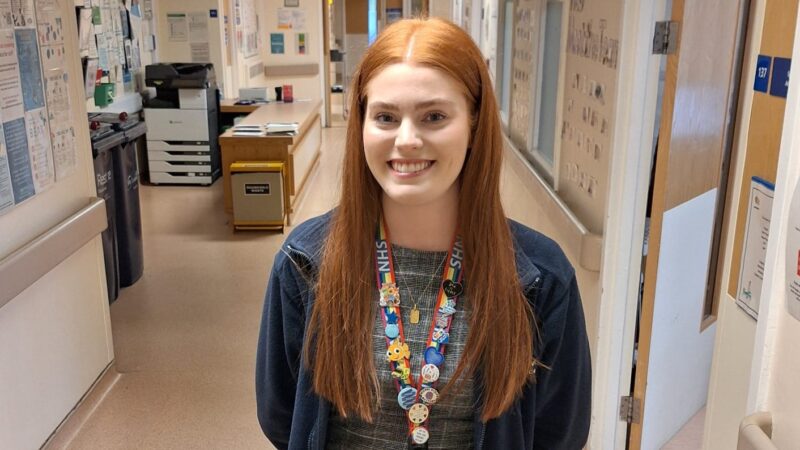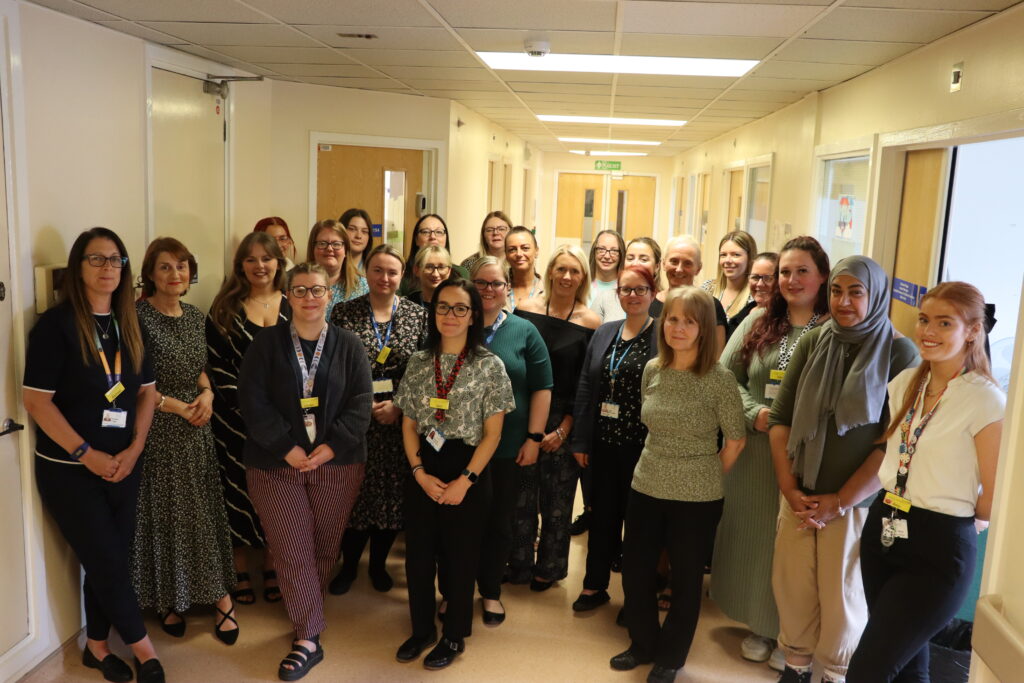
A young hospital administration officer has found herself making meaningful hospital improvements after discovering a passion for quality improvement.
Our trust’s quality improvement (QI) programme sees staff leading on innovation and change in hospital services – all to improve patient care.
Amy Todd-Davis began at the University Hospital of Hartlepool aged 19 as a clerical officer – answering phones and booking appointments for patients in the specialist services admin hub. When she took part in a leadership programme heading up an improvement project, she found a new passion for quality improvement.
Almost three years on, she has a newfound confidence in her new role as clinical support officer and as quality improvement lead in her department.
We sat down with Amy to find out more about how QI is paving the way in her successful career.
How did you first get involved with QI?
It came about when I first started at the trust. I was 19 and I had this ambition that I was going to change everything.
I was answering the phones and organising appointments for patients but I always wanted to do a little bit more than that. Then the trust launched 100 Leaders – which was a programme to improve hospital services while developing leadership skills.
I’d only been working here about six months so I didn’t really know what I was doing. It was absolutely terrifying but I was determined to push myself.
I got to have some experience of being the leader of our project group which was something totally different for me because I’d never been in any supervisory positions. Doing something like that was really crazy for me but at the same time, I think I got really lucky.
It made me realise that quality improvement was where I wanted to be – making more changes, not just for our department, but for the trust in general.

Who is QI for?
QI is for everyone. You don’t have to be a highly skilled clinician to do QI.
I didn’t go to uni, I didn’t have a degree and I came to the trust straight from a waitressing job. Because of that I thought ‘there’s no way this is for me’. But even knowing that I could get on an initiative like 100 Leaders – knowing that that was for everybody, not just clinicians – that was what made the massive difference to me.
You can start at the bottom and work your way through all the levels of QI. Then you can go anywhere from there. Just because you’re admin, doesn’t mean that you’re not important and it doesn’t mean you can’t make a change.
I’ve encouraged all the staff in the specialist services admin hub to get involved. Because as much as I’m with my colleagues all day, I’m not doing that job. They’re the ones who know if something could be made easier.
Patients play a part as well. If a patient comes into hospital, they might say ‘Have you ever thought about doing this?’. They’re not responsible, but that simple phrase can set off a chain reaction to making meaningful improvements, big or small.
It really is for everybody. Staff, patients and visitors each bring so many ideas that we can put forward to make a big difference.
How has the trust supported you in your QI journey?
After doing some of the other training available, I started the Quality, Service Improvement and Redesign gold course. It was incredible.
Most of the people there were very senior and I remember thinking that there was no way I was going to understand any of it. But it was better than I ever imagined and I learned so much from that course in five days.
The QI team’s been amazing. Leanne Mitchell’s our care group lead and I couldn’t ask for more from her. She’s always there if I need anything.
The help from the other QI champions within my care group has been great as well. Just knowing that there are other people doing the same thing as you is a massive help. We’ve got a shared spreadsheet set up so we can see what everybody else is doing and it really helps us to work collaboratively.
And my team within the specialist services admin hub has been so supportive as well. They’re always asking questions, everybody’s interested and they’ve always allowed me to do my own thing and run with my little ideas.
How has that training and support helped with making changes in your service?
There were a lot of things that I didn’t know went into quality improvement.
Before you even get started, there are tools like driver diagrams and fishbone diagrams all to help you realise what area you actually need to improve. Before I would have just gone with the most obvious choice. But when you really dig into it more, you see all the little factors that go into why something isn’t working.
Sometimes you realise that what you think isn’t working isn’t actually the issue. But if you make a change somewhere else, that can make a massive difference.
It also helps to see how those improvements are working. Before doing the training, I’d just judge it on whether it looks about right. But where you actually use data, you can see exactly how it’s working. We can prove that our change has made a difference.
Has QI factored into your personal progression?
While I was doing 100 Leaders, a job came up in my department on the next band up in a more supervisory role. So I went for it. I talked a lot about 100 Leaders in that interview and those transferable skills that I’d gained.
I’m pleased to say I got the job and then I was asked as well if I wanted to be QI lead for the department. I was a bit nervous about that because it was still new to me at the time but, of course, I accepted and it was one of the best things I did.
I’m part of something now that’s so much bigger than my initial job and I never expected to go that far. 100 Leaders really helped me a lot.
What projects have you supported with since becoming QI lead in your area?
I’ve recently been supporting my colleagues on a couple of QI projects which are helping to speed up processes for clinical staff and patients. They seem tiny but those small changes all add up and made such a difference.
One project has streamlined referrals from GPs – this is automatic now, instead of admin manually doing this.
Another has been to improve the way feedback is given to staff in the integrated musculoskeletal service. It’s been a little confidence boost to help the team understand how they are making a difference and it’s improved best practice in the service.
The most recent one is in nutrition and dietetics referral, which I’ve been working on with my colleague Penny. There’s a waiting list which we put patients on when they are first referred to the service. There’s an extra step in the system that’s irrelevant really but, if forgotten, can delay patients in getting their text to book an appointment.
So we’ve simply removed that step. It does seem so tiny and when Penny came to me, she was worried it was too small a change. But it’s made a massive difference. It’s one less step for clinicians that’s streamlining appointments for patients.

What’s next in your QI journey?
I haven’t got anything planned as of yet but I’m always looking for new opportunities to jump on. No matter what I do, I want to take QI further. But I always want to keep it within the trust setting.
I think QI, especially in somewhere like a hospital, is really, really important. Even if I don’t go on to do a QI role specifically, I always want to be doing it – no matter which department I work in.
Finally, one piece of advice you’d give to someone just starting on their QI journey…
Never think a change is too small or too big. Regardless of size, it will make a huge difference to someone.